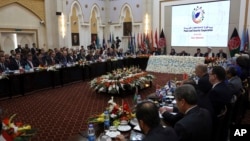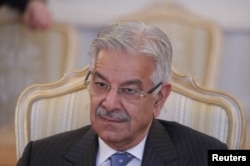Pakistan praised Afghanistan's president, Ashraf Ghani, Thursday for offering unconditional talks to the Taliban, pledging to extend any help "wholeheartedly" to further the peace effort between the warring parties.
Ghani, a day earlier, hosted an international conference named the Kabul Process where he invited insurgents to open an office in Kabul and engage in a dialogue with no preconditions to help end the prolonged Afghan war.
Pakistani Foreign Minister Khawaja Asif told reporters in Islamabad his country has always emphasized the need for warring sides in Afghanistan to seek a negotiated settlement to the conflict.
"President Ashraf Ghani's offer of peace talks to the Taliban is a considerate development," he said. "The Taliban are a political entity, a political force within Afghanistan because it is their country. So, it is a good move and a healthy sign emerging in Afghanistan [towards promoting peace]."
He pledged that "any assistance, any help in this regard from Pakistan" will be "wholeheartedly" given to Afghans, if required.
"And if they would like to utilize any other platform, a trilateral, or a quadrilateral, or if they would need help from neighboring, or regional countries, everyone will be ready to do so," Asif added.
The Taliban has not officially responded to Ghani's offer of a peace dialogue. But the group has refused past offers of engaging in talks with Kabul, saying only the United States, and not its "puppet" Afghan rulers, can determine the fate of the war.
Taliban insurgents and members of the Haqqani Network are allegedly using sanctuaries on Pakistani soil to sustain and extend insurgent activities, charges Islamabad rejects.
Afghan and U.S. officials have been pressing Islamabad to eliminate the "safe havens" and push the Taliban to the negotiating table.
"The presence of [U.S.-led] foreign forces in Afghanistan has not served any purpose, said Asif. "It has not brought peace to this region, rather the situation has become much more grave than it was 20 years back."
He said Pakistan, together with China, Iran, Russia and Turkey, is making efforts to promote a regional solution to the Afghan conflict and Ghani's offer to the Taliban is in line with those efforts. Asif insisted that neighboring and regional countries have "direct stakes" in whatever is happening in Afghanistan.
"Our stakes are much, much higher, rather these stakes are existential stakes as compared to America, who [is] remote-controlling things in Afghanistan," Asif asserted.
Differences over how to fight terrorism and stabilize Afghanistan have hurt Pakistan's relations with the U.S.
Asif said the tensions and security challenges facing his country stem from Islamabad's polices of siding with Washington in the Afghan resistance against Soviet occupation of the neighboring country and joining the U.S.-led military coalition that invaded Afghanistan after the September, 2001 attacks in the U.S.
But Pakistan, the minister said, is in the process of correcting its foreign policy to wanting to be "close to friends in the region. "But we will, in no way, sacrifice our national interests and become an American proxy, or safeguard American interests like we did in the past," he stressed.





